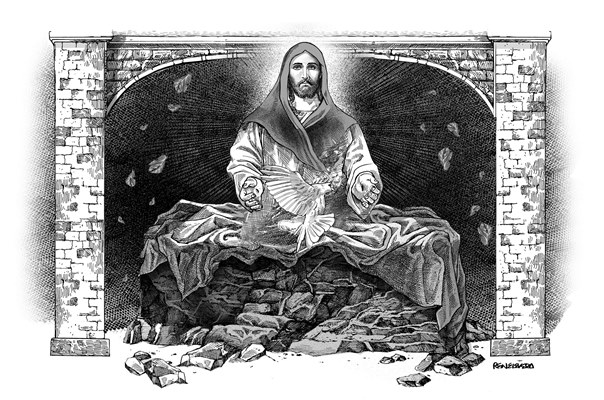It took us an hour to reach the place. Clouds muted the mid-afternoon light but drifted too far up to fall as rain.
It was quiet when we got there, generally, because in the quadrangle between the buildings of the girls’ school, which stood in the same compound as the residences of the nuns, children dallied on the seesaws and the swings, waiting for their parents to pick them up after an afternoon of dancing or sports which would keep them preoccupied during the school vacation. Such were the children — a picture of peace that the wife could not resist capturing them en passant on her cellphone camera.
The one who arranged our visit phoned that morning to tell us that we were expected and that the nun who taught me literature and religion in high school would prepare a special repast for us.
“Praeter solitum” was the term we used in the seminary for that special something, which could be a whole meal or an aspect thereof, such as ice cream, as during a feast or when there was a visitor.
And there they stood in welcome as we entered the lobby. Introductions had to be made, however, since time had either bloated or emaciated us and we had to scrutinize each other’s physiognomy for a trademark feature that would give us away. One of the nuns, who came to teach in our town when just in her twenties, and who was now in her seventies, could not place me until we were about to leave. We all but jumped with joy at her aha moment.
We were led into the refectory and there surrounded by more nuns, octogenarians on the average, who offered us chiffon cake (not the praeter solitum, which would be served in due time). As we tried catching up on each other, the questions moved fast between us like the weaver’s shuttle.
The wife met two of her college teachers. She had spoken to me about them with admiration, and now that we were face to face I could see why. They had a depth and clarity of mind that no dementia could scuttle.
We were reminded of the meal that awaited us in another building, to which a ninety-one-year-old nun volunteered to bring us, perhaps to demonstrate how limber she stlll was despite her age.
She told us the secret of her longevity–music. She played the piano everyday. She it was to whom for a year once upon a time we entrusted our daughter for piano lessons. When she was sure that we would not miss our destination, she left, but not without letting on a detail of her past–even as a little girl she wanted to enter the religious life, just like a teacher in grade school, a nun, who had caught her fancy.
The meal was, well, as advertised. I mean that it was really beside the usual, praeter solitum–macaroni soup so delicious that I thought of Abraham Maslow’s “A first-rate soup is more creative than a second-rate painting.”
And in between sips the wife and I exchanged pleasantries with the nun who initiated pubescent me into the mystery of God and the mastery of language–words and the Word.
Earlier, when the wife expressed the desire to write a study on aging, one of the nuns said that once more they could be her teachers. The nun was right, because she and the others had the wisdom of the years. But I thought of gravity and mused that more than wisdom, in itself no small thing, the nuns had with age acquired a paper lightness, which made them seem otherworldly.
I really should call them Easter people, to whom even before death the Resurrection is a reality, something lived on a daily basis. And not just because they could pass like a breeze through the curtains, so lithe they were. But also because their joy was the joy of those who, having espoused themselves to Christ and spent their lives for others, were now awaiting their reward, which already was theirs.
I noticed that though they moved about quite a lot they hardly ever ruffled the furniture. Perhaps this was just my impression–the gentleness of a feather about the place, the lightness of the rainbow on grass, the very image that Gerard Manley Hopkins uses to describe a resurrected body– “meadow-down is not distressed / For a rainbow footing it nor he for his bónes rísen.”
